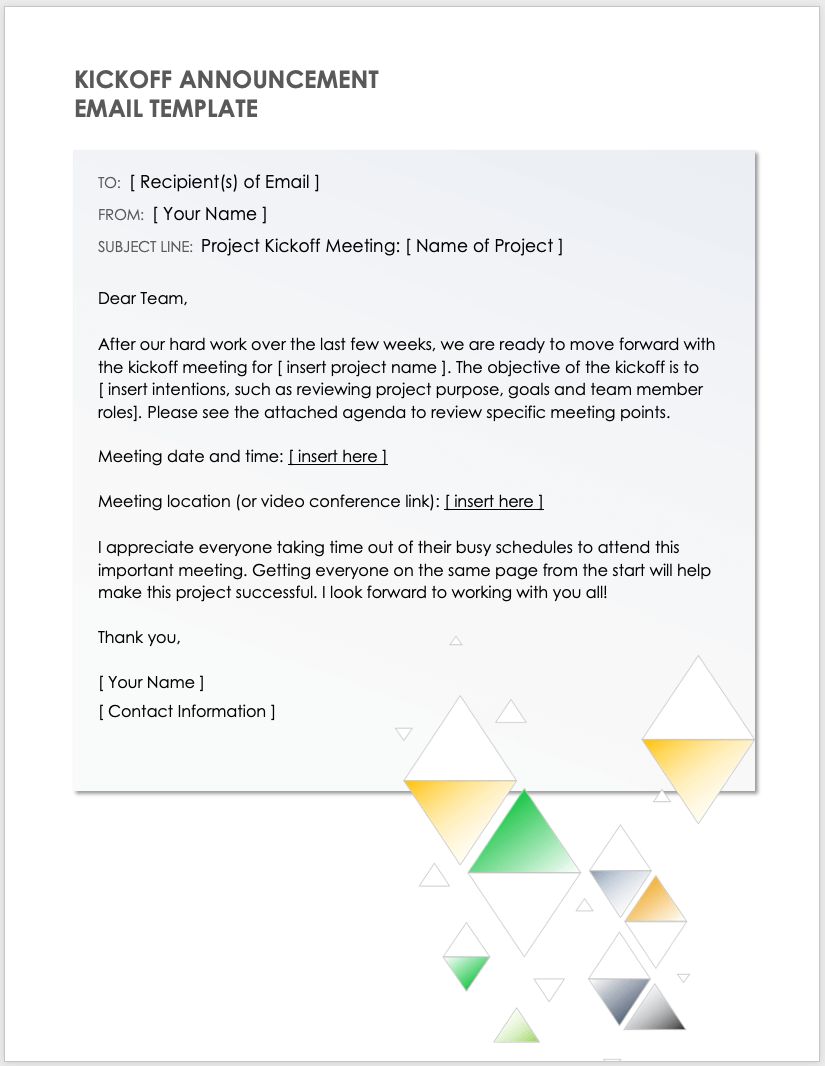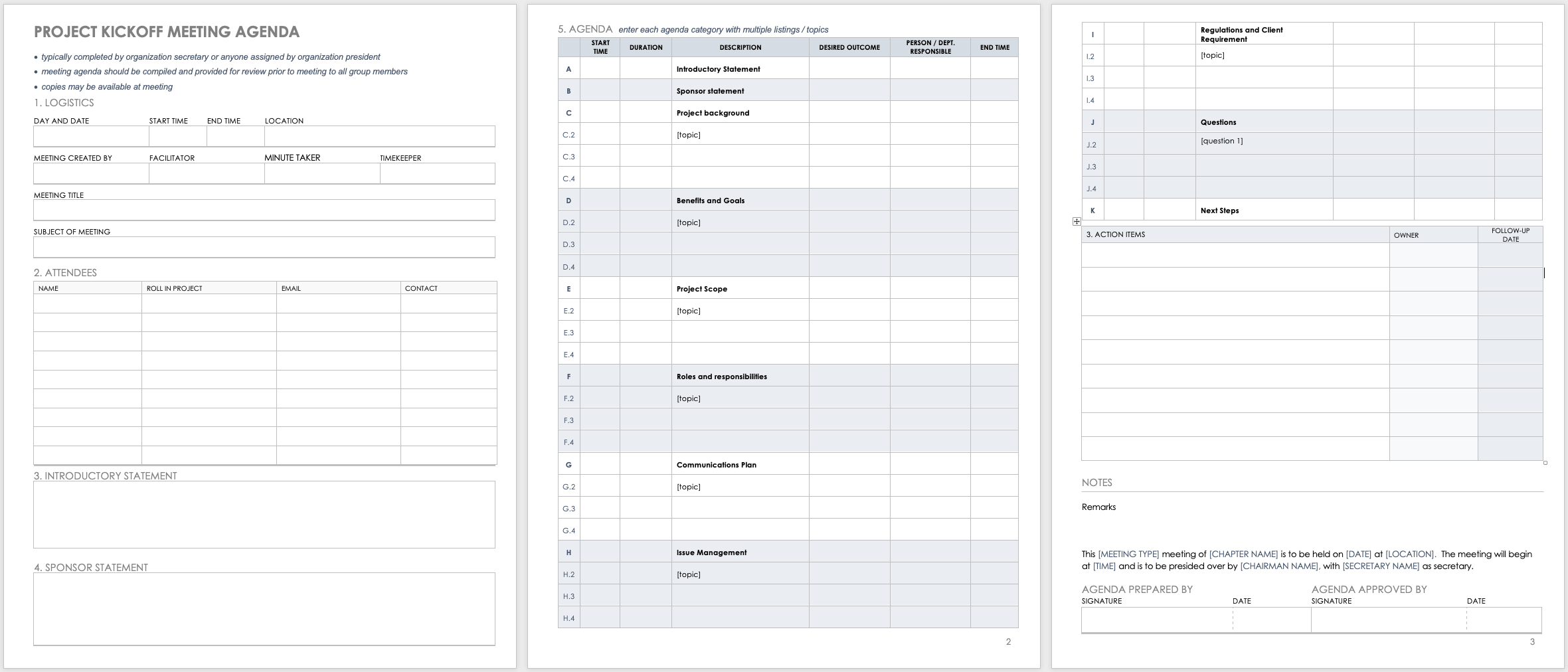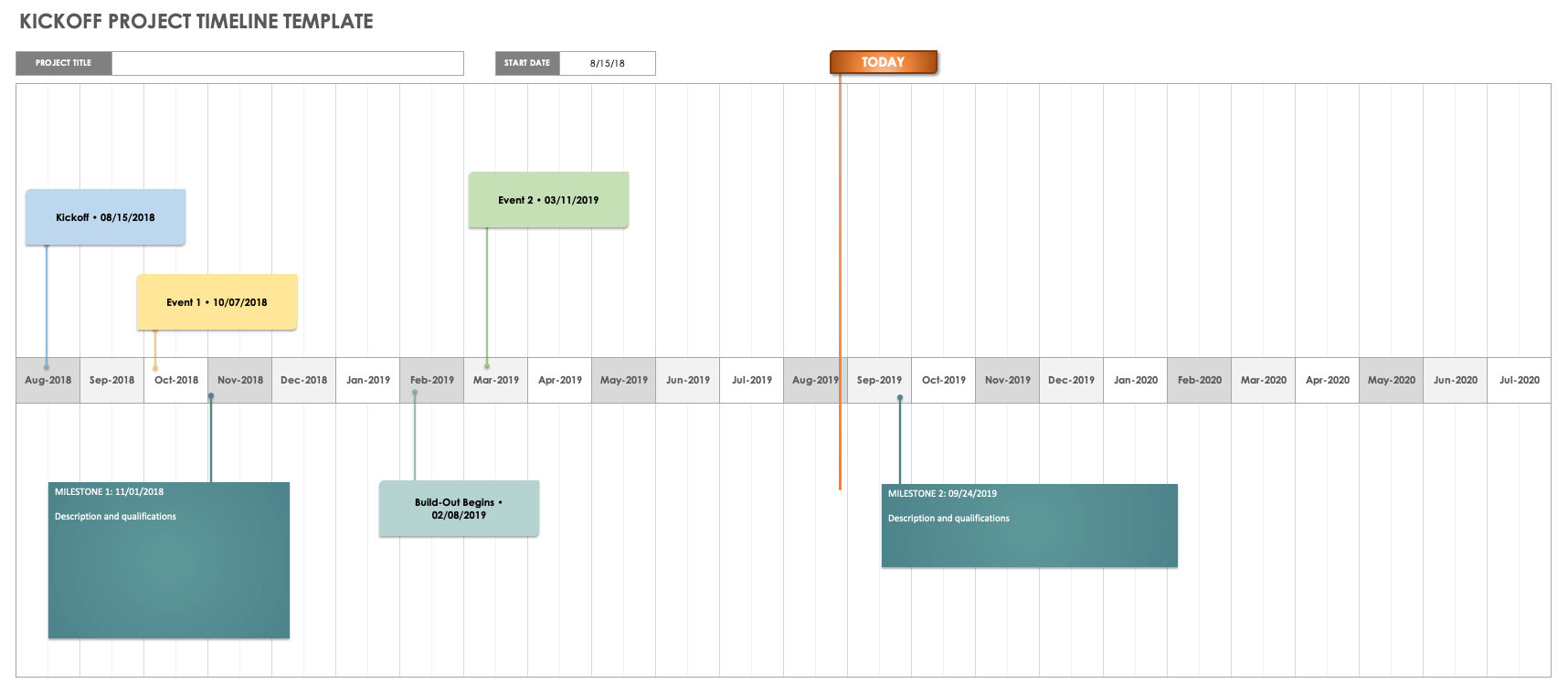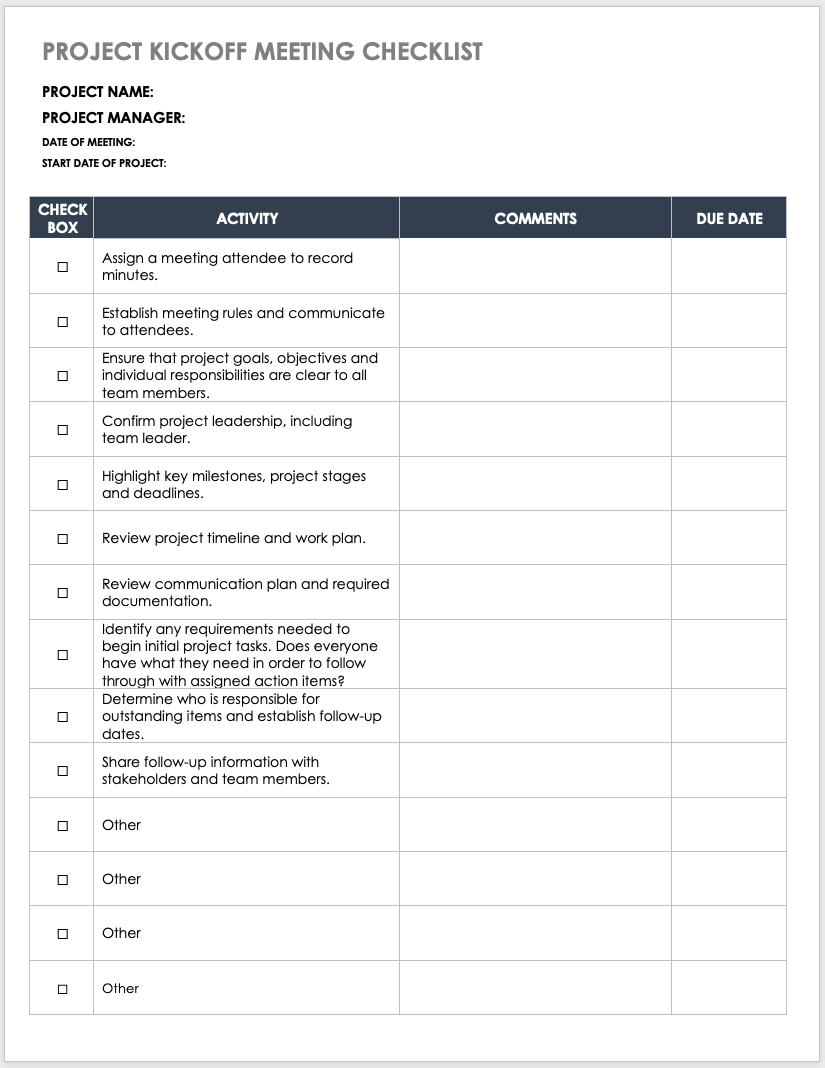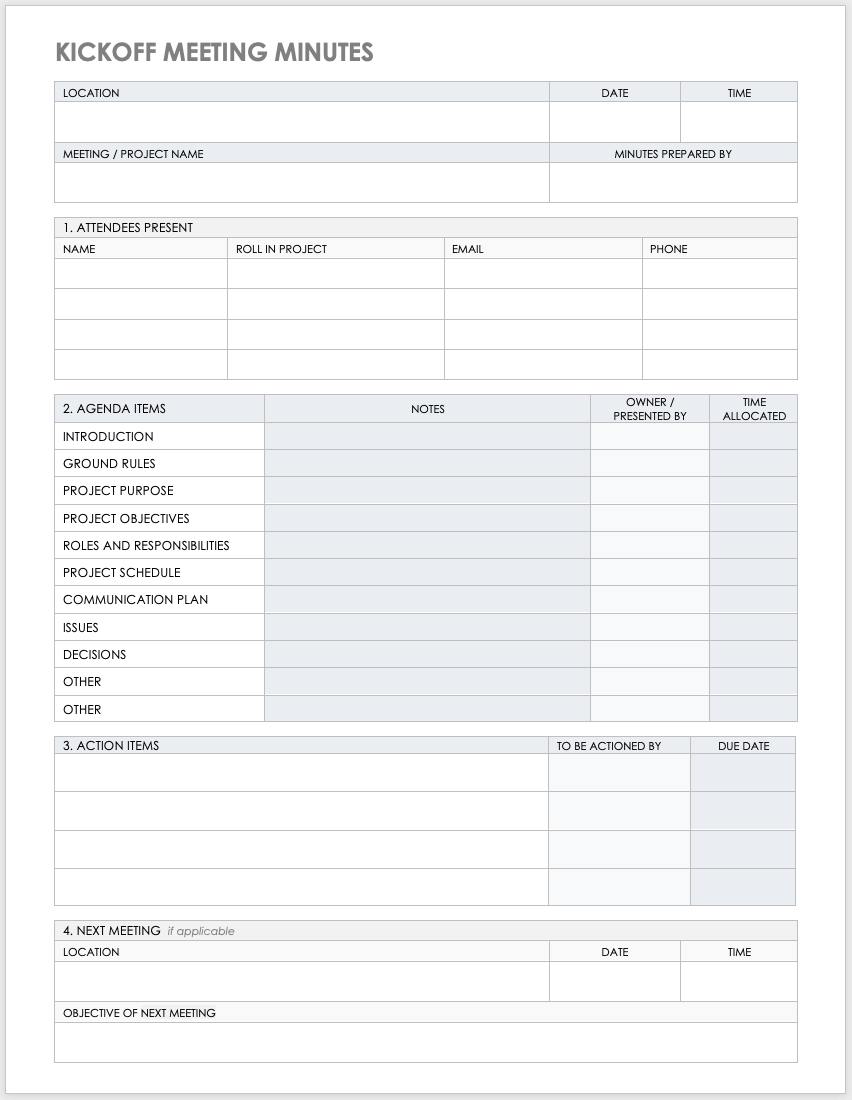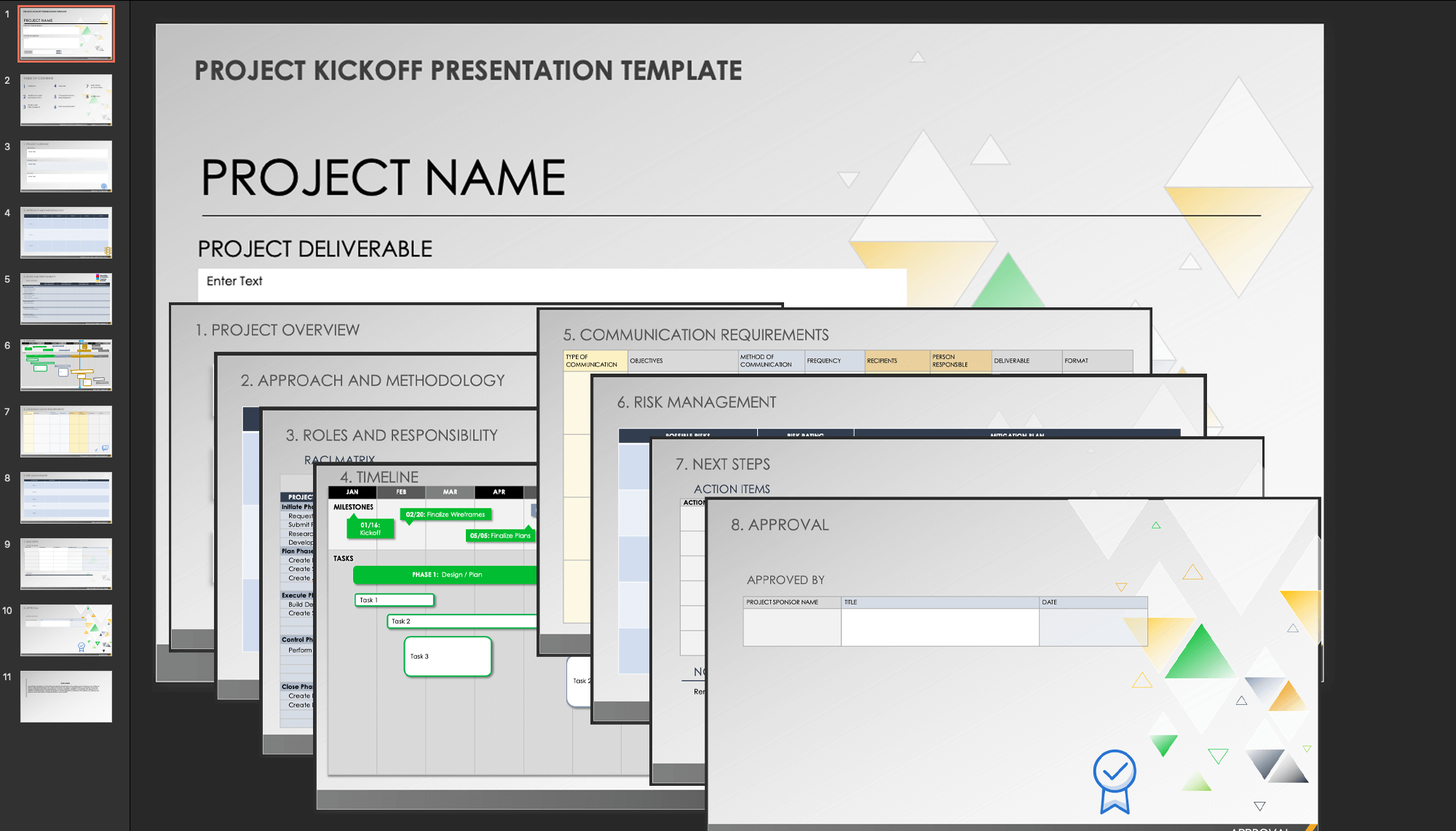What Is a Project Kickoff?
A project kickoff meeting is the first meeting between the project team and the client, when you establish expectations, communication, and goals. The meeting allows both parties to define the project's purpose and what they consider a success.
Additionally, the investor gains insight into how the money will be spent and why this project is beneficial
Purpose of a Project Kickoff Meeting
The purpose of a project kickoff meeting will depend on who is involved. An internal project kickoff meeting reviews the purpose and goals of the project, while a project kickoff meeting for stakeholders and clients enables both parties to share their perspective on project background and purpose, as well as establish a working relationship with the project team. A project kickoff meeting can also benefit Agile teams when they take on a new project or when you onboard a new team member, as it ensures that everyone is on the same page.
Project Management Guide
Your one-stop shop for everything project management

Ready to get more out of your project management efforts? Visit our comprehensive project management guide for tips, best practices, and free resources to manage your work more effectively.
What Should a Project Kickoff Meeting Include?
A project kickoff meeting should include the following:
- Introductions: Let everyone announce themselves and the role they will have in the project.
- Agenda: Reiterate the plan for the meeting, with items for discussion and time delegation.
- Executive Summary: Review the background and overall purpose of the project.
- Project Scope: Review the statement of work (SOW), goals, timeline, budget, and constraints.
- Deliverables: Define the material goals of the project or the items sent to the client.
- Define Success: Align the client and project team’s vision to ensure all parties have an understanding of the metrics for success.
- Questions: Allow ample time for questions from both parties.
- Provide Communication Channels: Give the client a point of contact, and tell the project team how they will be in communication with one another.
- Next Steps: Review any follow-up actions needed after the conclusion of the meeting.
What Is a Project Kickoff Presentation?
A project kickoff presentation is a document presenting the agenda or topics covered in the meeting. The presentation provides a visual aid for attendees and guidance for the presenter. It also helps advance the meeting and keep discussions on topic.
A well-prepared presentation can leave a lasting impression on the client and investors, ensuring professionalism and confidence.
How Do You Introduce Yourself in a Project Kickoff Meeting?
A project kickoff meeting should start with introductions for all attendees. State your name and your role in the project, along with a small personal fact or highlight. This allows everyone to get to know each other and find commonalities.
When addressing the group, be conscious of your body language and how you present yourself. By keeping your arms open and out to your sides while speaking and making eye contact with people, you show that you are open, listening, and engaged. Practice your introduction before the meeting — this helps ensure that you come across as confident and excited for your role in the project.
What Is Discussed in a Project Kickoff Meeting?
Hassan Osman, project manager and author of Project Kickoff: How to Run a Successful Project Kickoff Meeting in Easy Steps, shares what he feels are the most important topics to discuss in a project kickoff meeting.
According to Osman, an effective project kickoff meeting should fulfill the following three goals:
- Inform everyone of the project goals.
- Introduce stakeholders to each other so that they’re aware of everyone’s roles and responsibilities.
- Generate enthusiasm among the team members, and motivate everyone to get started on the project.
When to Plan the Kickoff Meeting
A kickoff meeting typically occurs at the beginning of the project lifecycle, before any project work begins.
How to Plan for a Project Kickoff Meeting
When planning for your kickoff meeting, it is essential to address the following questions:
- How long should the meeting be?
- Who should attend?
- What should be discussed?
- Where should it be held?
- What documents should you print?
It is also important to consider the best time for all parties involved to attend. You can do this by creating a poll for attendees to respond to or by sending out an email invite that allows attendees to suggest alternative times, if needed. Once you solidify a meeting date, send out a project kickoff announcement email to all attendees.
Project Kickoff Meeting Agenda
A meeting agenda provides an outline of the proposed meeting schedule. Meeting agendas help you keep the meeting on track and ensure the team discusses all necessary topics. When creating your meeting agenda, here are some items to consider:
- How much time do you have for the meeting?
- What do you need to communicate with the client?
- What do you need to communicate with the team?
- Who is responsible for talking about each item?
- How much time should you allot for each item?
- Do you need to answer any questions at the meeting?
- What is the intended outcome of this project?
- What resources do you need?
- Have we done similar projects before? If so, what did we learn from them?
It is also important to consider how the agenda may differ when holding kickoff meetings with your team, stakeholders, or a client.
“The agenda is fairly similar across the different types of kickoff meetings, in the sense that the objectives are the same,” says Osman. “However, if you are conducting a kickoff meeting for a client, then the internal kickoff meeting is a bit different from an external kickoff meeting.
“Think of the internal kickoff meeting as a dry run of the external kickoff meeting, in which you review the presentation and ensure that your team is all on the same page before the external meeting. [An internal meeting] also helps the presenters practice delivering the meeting ahead of time with a real audience and make any changes to the agenda (if needed).”
Step by Step: How to Run an Internal Project Kickoff Meeting
An internal project kickoff meeting is essential to make sure the entire project team is familiar with the project and prepared to meet with the client. Here are some helpful steps to running a successful internal project kickoff meeting:
- Introductions: Have everyone introduce themselves and their role in the project. Allowing the team to get to know each other will help create camaraderie and excitement for the project. Introductions are also a great chance to try some icebreaker games.
- Discuss the Client’s Background, Stakeholders, and Problems: Familiarize the team with the client and the problem(s) they face so that they can better understand the client’s needs.
- Discuss Project Purpose: Review the project’s purpose; this helps the team orient themselves and prepare to develop strategic solutions.
- Discuss Proposed Solutions: Discussing solutions internally will help the team prepare and present the best solution to the client. Kickstart this session with a brainstorming activity to come up with creative and strategic solutions. This is also an excellent time for mind mapping or storyboarding.
- Review Project Scope: The project scope is a vital part of the kickoff meeting, and should include a statement of work, goals, project timeline, budget, any constraints, and the completion date.
- Review Action Plan: The action plan should cover task management, how the team tracks milestones, and the work management program that the team will use.
- Discuss Risks, Assumptions, Issues, Dependencies (RAID): Communicate with the team about how you plan to address any issues that may arise. Doing so is vital for mitigating risks that may prevent the team from meeting the project deadline, budget, or goals.
- Review Collaboration and Communication Tools: Establish which communication tools your team will use to communicate with one another and stay informed of the project’s progress.
- Discuss Reporting: Discuss how each team will track their milestones and report on their progress.
- Client Kickoff Agenda: Begin the discussion of which items should be on the meeting agenda. The focus should be on topics that need to be reviewed or clarified with the client.
- Questions: At this time, have the team voice any questions or concerns before meeting with the client.
Download a Project Kickoff Template Starter Kit
Get everything you need for a project kickoff meeting in our project kickoff starter kit, which includes a project kickoff announcement, agenda, timeline, meeting checklist, meeting minutes, and presentation template in one easy-to-download file.
Project Kickoff Announcement Template
The project kickoff announcement email offers an important first impression for all meeting attendees. Use this template to send a formal and polished announcement with all the information attendees will need.
Download Kickoff Announcement Email Template - Microsoft Word
Project Kickoff Agenda Template
Use this template to create a meeting agenda. The template includes a section for each proposed agenda item and an accompanying time allotment. Some example agenda items include introductions, project background, benefits and goals, project scope, roles and responsibilities, project schedule, communications plan, issue management, regulations and client requirements, questions, and next steps.
Download Kickoff Agenda Template
Kickoff Project Timeline Template
The project timeline is a crucial component of the kickoff meeting. Use the template to create a project timeline to help the team stay organized and easily track progress, events, and milestones.
Download Kickoff Project Timeline Template
Project Kickoff Meeting Checklist Template
When you have a simplified list of tasks to complete, meeting preparation can be less daunting. Use this template to check off each task as you complete it.
Download Kickoff Meeting Checklist Template
Project Kickoff Meeting Minutes Template
Use this template to track what you discuss in the meeting, and write clear, brief notes under each outlined topic. Organized meeting minutes will help you recall the small details so you can focus on the big picture.
Download Kickoff Meeting Minutes Template
Project Kickoff Presentation Template
Use this kickoff presentation template to create a slide deck that will set you up for success and enable you to present with confidence. This template includes slides for contents, project overview, approach and methodology, roles and responsibilities, project timeline, communication requirements, and risk management.
Download Kickoff Presentation Template - Microsoft PowerPoint
You can download a variety of free project kickoff templates by visiting our template roundup page.
What to Do After a Project Kickoff Meeting
After a project kickoff meeting, share the results with the team and schedule follow-up tasks. These tasks may include distributing notes, reaching out to the client, and scheduling a meeting with the project team.
After reviewing your notes from the project kickoff, do the following:
- Share meeting notes or a summary with all attendees.
- Send a follow-up email to the client and invite additional questions or concerns.
- Schedule an internal follow-up meeting to further discuss the meeting and project with the team.
Expert Tips for Successful Kickoff Meetings
A successful kickoff meeting will look different depending on the project, team, and client. However, you can take key steps to put your team on the track to success. Here are some expert tips on agenda keeping, note taking, communicating, and presenting:
- Keep the meeting brief, using a time limit and focused agenda. By allotting times for each agenda topic, you can help keep the discussion on track. Sticking to the time limits will ensure your meeting is brief, which helps maintain engagement and excitement. Agenda items that need more time or require more details should be discussed further in a follow-up meeting.
- Establish clarity and excitement with both the client and the project team. Presenting each agenda item and allowing both the project team and client to share their thoughts will ensure everyone is on the same page and clear on the expectations. Convey excitement with open body language, enthusiasm, and confidence. The client should have time to express their vision and why they are excited about the project, and the project team should express their excitement about their role in bringing that vision to realization.
- Assign a dedicated person to take meeting minutes or record the meeting (with permission). Meeting minutes will allow both parties to review your discussion. They also enable effortless follow-up and serve as a reference point moving forward for the project team and client. Meeting minutes should note the following:
- Date and time of the meeting
- Names of the meeting participants and absentees
- Any additions to the current agenda
- Actions taken or agreed to be taken
- Any open discussion or participation for each agenda item
- Provide an open platform that invites ideas, opinions, questions, and concerns. Pause after each agenda item to allow input from all attendees. Ensuring everyone feels like they have a chance to speak is critical for creating an open platform. It may help to offer attendees the following prompts:
- Are there any questions before we move on?
- Any thoughts before we move on?
- Does anyone have an idea they would like to share?
- Any questions, concerns, or comments?
- We would love your input.
- We appreciate any ideas or suggestions on this topic.
- Produce a communication plan for your team. Outline how often and on what platforms communication will occur with the client, both internally and externally. Implementing a system that creates an efficient workflow among teams is important to make communication accessible and optimized. A project initiation template is useful for keeping all team members and stakeholders looped into the project’s current status.
- “Be well prepared and practice delivering your presentation ahead of time, because your kickoff meeting is your main chance at leaving a positive first impression,” says Osman.
- If you can, host the kickoff meeting on your turf, so you have better control of the client’s experience and familiarity with the presentation equipment. If you are presenting in a new environment, take the time to scope it out beforehand. Note what you will need and practice using any equipment involved.
Get the Most Out of Your Project Kickoff Meeting with Project Management in Smartsheet
From simple task management and project planning to complex resource and portfolio management, Smartsheet helps you improve collaboration and increase work velocity -- empowering you to get more done. The Smartsheet platform makes it easy to plan, capture, manage, and report on work from anywhere, helping your team be more effective and get more done. Report on key metrics and get real-time visibility into work as it happens with roll-up reports, dashboards, and automated workflows built to keep your team connected and informed. When teams have clarity into the work getting done, there’s no telling how much more they can accomplish in the same amount of time. Try Smartsheet for free, today.
